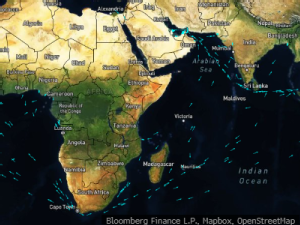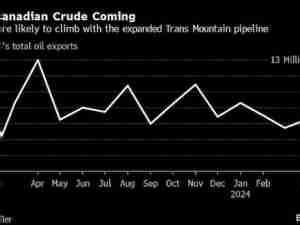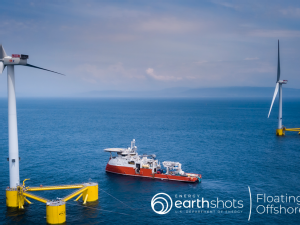Russian supply cuts and air strikes in Ukraine will cost Moldova more than $1 billion this winter to cover additional energy costs, according to a draft document. The sum amounts to 8% of one of Europe’s poorest economies.
The 19-page draft, to be presented to foreign diplomats and leaders ahead of a Nov. 21 support conference for Moldova in Paris, describes a sustained campaign by Moscow and local “criminal groups” to bring down the pro-Western government of the nation wedged between Ukraine and Romania by stoking turmoil.
The so-called non-paper places the costs at €1.1 billion ($1.1 billion) and says Moldova will need some €450 million in foreign aid to plug its budget gap, cushion consumers, and sustain the nation during the heating season. It also calls for military aid to beef up its meager defenses, after Russian rockets began crossing Moldova’s air space.
The document, seen by Bloomberg, sketches out a dire economic situation, including a seven-fold increase in gas prices, a quadrupling of electricity costs and 34% inflation. Average real incomes fell 12% in the first quarter of 2022, even before the latest energy crisis, it said.
In an interview, Foreign Minister Nicu Popescu described the cost estimate as a “fluid” government calculation, because further Russian action and energy prices on the European markets are unpredictable.
As of November, Russia’s bombing of Ukraine’s energy infrastructure and the halving of natural gas exports to Moldova have eliminated flows from the country’s previous sources of imported electricity. Imports from Romania account for about 80% of Moldova’s current consumption, with the remainder produced locally.
Russia’s Role
“These are deliberately planned actions” aimed at destabilizing Moldova, Popescu said in his office in the capital Chisinau. He added that they were “designed to target and weaken Moldova’s energy security, but with that, the whole functioning of the Moldovan economy and of the political system.”
Russian Foreign Ministry spokeswoman Maria Zakharova dismissed allegations that Russia weaponizes energy as “absurd,” saying gas giant Gazprom PJSC’s behavior was “purely commercial” and that the company had given Moldova preferential terms. She accused the government in Chisinau of trying to distract its citizens from the country’s economic problems.
On Tuesday, the government asked Moldova’s courts to declare unconstitutional the Shor opposition political party, named after its leader Ilan Shor, who now lives in Israel. The party has been holding weekly anti-government protests and promising to restore relations and renegotiate gas prices with Russia.
The US Treasury on Oct. 26 sanctioned Shor, as well as eight other Moldovans, alleging that he had worked with Russian authorities to subvert Moldova’s democracy for years. Shor has dismissed the allegations and described the sanctions as proof that Moldova’s pro-Western president, Maia Sandu, feared she would soon be toppled by street protests.
Moldovans Joining Ukrainians
The current government, elected to a sweeping majority last year, doesn’t appear at imminent risk of removal and doesn’t face new elections for several years. Yet it has slid behind opposition parties in opinion polls as living costs have soared.
The government has kept the lights and heat on by slashing consumption and securing power from neighboring Romania, but at more than triple the cost it had paid just weeks before. Some companies have had to shut down.
Popescu said that, should Russia be allowed to succeed in its goals, the increased turmoil would risk adding Moldovans – about 1 million of whom have European Union passports – to join a likely wave of Ukrainian refugees fleeing freezing temperatures this winter. Moldova itself hosts 95,000 Ukrainian refugees and since the start of the war has become an important transit route for Ukrainian grain, fuel and other trade with Europe.
Further destabilization efforts could also reignite tensions with Moldova’s pro-Russian, separatist territory of Transnistria, which fought a war with Chisinau in 1992 and hosts the mainly gas-fired power plant that provided 70% of Moldova’s electricity imports until last month.
Pushing an Open Door
Those were halted this month amid capped flows from Gazprom to Moldova -- including Transnistria. Gazprom’s deliveries are just 51% of contractually agreed volumes for November, according to Moldova’s deputy premier, Andrei Spinu.
Gazprom blamed Ukraine for capped flows after the nation put a key cross-border point for gas transit out of service, since Kyiv could no longer control it under Russia’s occupation. Officials in Ukraine say there is no such hurdle, because the rest of the transit network is running below capacity.
Moldova should get a sympathetic hearing from from the US and EU. The government has drawn accolades from western capitals for its anti-corruption, reform agenda. That and Moldova’s regional significance has helped unlock aid, secure its candidacy for the EU and attracted a raft of foreign advisers.
With the ex-Soviet republic’s high energy dependence on Russia already known, the European Bank of Reconstruction and Development agreed to a €300 million euro facility to Moldova buy gas for storage this summer. Ukraine drew down and spent the first €100 million since in October.
“We’ve been working on this facility since November last year,” said Angela Sax, who heads the EBRD’s Moldova office. The fund was put in place, she said, precisely to hedge against the risk that Gazprom might suddenly cut supplies. “Our money is only for procuring gas from alternative markets.”
European Commission President Ursula Von Der Leyen was due to visit Moldova late Wednesday.









